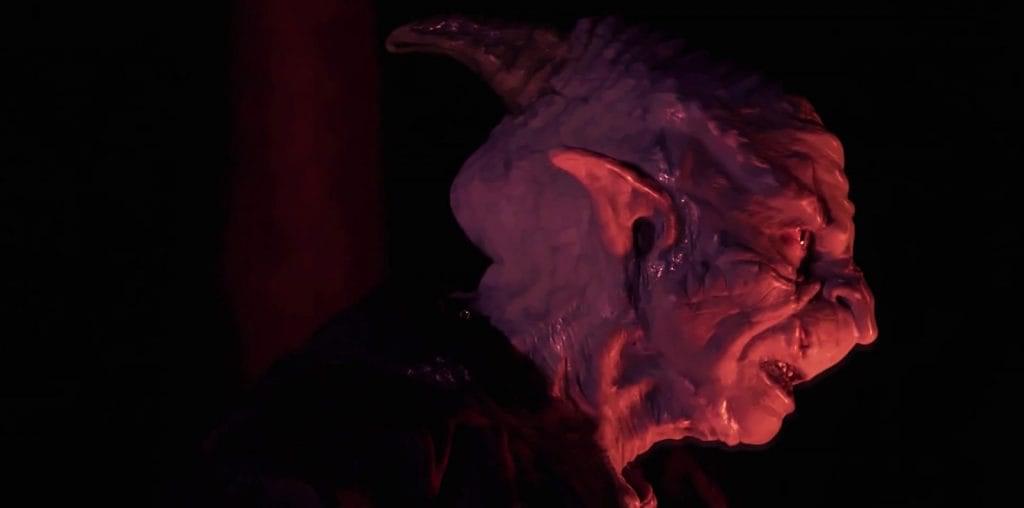
“You didn’t miss anything if you weren’t in New York in the 80s. All you missed are the clubs and the drugs and some of the sex.and you missed meeting some of these people that would die in sort of accidental situations.” – artist David West.
Having never been in New York in the ’80s (or indeed ever), this writer cannot confirm or deny the truth of the above statement. What you/I missed, however, was the chance to be in one of the films by the Cinema of Transgression, a loose coalition of (somewhat lunatic) fringe dweller filmmakers who operated in New York’s Lower East Side from 1984-1991. Whether or not you regard this as a missed artistic opportunity depends on how you view the output of the COT from that period. If transgressive punk-styled nihilistic violence, sex, drugs and chaos aren’t your thing, then you definitely didn’t miss out.
And you definitely won’t be interested in “Llik Your Idols,” the new 70-minute documentary detailing the good and bad and ugly elements of the Cinema of Transgression. This arthouse-cum-grindhouse -cum-madthouse-influenced low budget Super-8 filmmaking movement was a loose coalition of lost, angry, damaged, searching, confrontational extreme artistic personalities who found themselves drawn by their personal neuroses and psychoses to the black hole of the Lower East Side during the late 70s/early 80s, during the period of time after punk had razed that city’s artistic pretensions and expectations and the No Wave musical scene was enveloping New York’s edge-dweller artists in its nihilistic smothering discomfort blanket.
Filmmakers and actors/writers like Richard Kern, Lydia Lunch, Nick Zedd, Tommy Turner, Beth B, Casandra Stark, David Wojnarowicz and others formed the Cinema of Transgression, a moniker Nick Zedd gave the movement in his Xeroxed self-cheerleading fanzine ‘The Underground Film Bulletin’. These desperate characters wanted to go as far out as they could on film to explore their own private winding internal artistic and pathological paths without worrying about self-censorship or government interference. As chief propagandist Zedd put it, in part, in the slightly pompous and pretentious ‘Cinema of Transgression Manifesto’:
“Intellectual growth demands that risks be taken and changes occur in political, sexual and aesthetic alignments no matter who disapproves. We propose to go beyond all limits set or prescribed by taste, morality or any other traditional value system shackling the minds of men. We pass beyond and go over boundaries of millimeters, screens and projectors to a state of expanded cinema. We violate the command and law that we bore audiences to death in rituals of circumlocution and propose to break all the taboos of our age by sinning as much as possible. There will be blood, shame, pain and ecstasy, the likes of which no one has yet imagined. None shall emerge unscathed.”
And you thought it was all just about sex and drugs and rock and roll.
Despite, or maybe because of, these lofty ideas and ideals, what the films generally ended up being were primitive Super-8 X-rated skinematik howls by their authors, nihilistic sex-and-death-tinted bodily fluid fingerpaintings ripped red and raw and dripping from the fevered fractured psyches and libidos of their far-out creators. Presubscribed ideas about sexuality and violence (or any blood-and-comeslick combo thereof) and religion and the family were attacked in a constant obscene stream of scream-of-subconscious short films and music(k) videos; basically the artists involved set out to challenge every moral and more that Reagan’s greed-is-good presidency had set out as a conservative repressive blueprint for life in 80s America. Provocative releases from the Deathtrip Films (Kern’s cinematic rubric) subverted and perverted every societal norm they could, and had a sweet sick drugged-out fun time doing so, often to a pounding soundtrack by the twisted musical genius JG ‘Foetus’ Thirlwell.
“Llik Your Idols” by French filmmaker Angelique Bosio documents the still-influential (and still underground) Cinema of Transgression by interviewing a few of its main adherents (Kern, Lunch, Zedd, amongst others) and talking to them about their taboo-trashing frantic cinematic antics two decades later (although Kern continued to make films until the early 90s, and Zedd makes a New York cable TV show called “Electra Elf” to this day). Using a selection of clips from various productions it gives us an overview of the COT and its main thematic concerns; contextualizes the loose-knit movement by talking about the time and place that spawned it, and the societal and political atmosphere that fueled some of its most fertile fires and furies.
“Idols” is a good, entertaining, eminently viewable documentary, and a great starting point for anybody who is interested in the COT and its nihilistic no future agenda and agent provocateur members. Richard Kern (whose “The Hardcore Collection” I recently reviewed and noted that many of the COT films are shoddily-shot time capsules that don’t hold up all that well today, except in a raw angry power-of-poke-in-the-eye-images way) is quite down-to-earth about the whole thing, noting his art background and just saying well, basically that’s the extreme stuff he was into exploring back then.
Nick Zedd and Lydia Lunch (who look and dress like they did 20-odd years ago) don’t fare as well. Zedd has delusions of grandeur, and believes that at some point in the future he will be recognized as a Great Confrontational Underground Filmmaker of The Ages, saying that people are afraid of his stuff because it’s too radical and controversial. I think the words “nobody cares less 20 years later, Nick, wake up” come to mind, personally, but well, you know, we each have our own view of ourselves. Then again, I haven’t seen his later stuff like “Whoregasm” or “War is Menstrual Envy” so maybe my opinion would change if I did. But I doubt it. He talks about how not one critic at the time the movement was around supported them, and I’d have to say that this is bullshit, pretty much. Back in 1986 Zedd contacted Chris Gore, Film Threat’s founder, upon seeing a Xeroxed copy of the now-defunct magazine incarnation of this website. Chris used to run regular articles by Zedd, and also about the COT, in FT in the ’80s (that’s where I first heard about them in 1987, from ads in the back of the mag, where you would have things like Lydia Lunch modeling FT tee-shirts), to so claim that nobody cared or wrote about them is total and utter garbage (editorial note: we did run a false obituary of Nick Zedd (which influenced Tarantino’s “Zedd’s dead.” in “Pulp Fiction”) at one point so we cared to the point of being fed up with caring… and with the COT). Still, I suppose that it makes for a better “us versus the uncaring philistine world” story.
Lydia Lunch talks about her spoken word performances as verbal sparring matches with the audience, and I’d have to say that I don’t think she would have much to say these daze that was all that radical or challenging, though of course what she was saying and doing back then was groundbreaking in some ways for the time. It’s ironic. In the late 80s FT ran an analysis of Lunch by a psychologist based on a spoken word video of hers, “The Gun is Loaded.” The psychologist concluded that unless Lunch let go of the pain she was in (she was, horrifically, abused as a child by her father) that she would still be the same suffering individual 20 years later.
Quite prophetic really.
Unfortunately.
As well as COT members we also have interviews by people like Jack Sargeant, author of “Deathtripping,” the excellent authoritative and informative (if occasionally too over-analytical-and-intellectual) book from England’s Creation Books about the movies and their makers; and Thurston Moore of Sonic Youth, for whom Kern made a video for their song “Death Valley 69.” Having people like this in the movie helps to add a note of objectivity sorely needed; Moore especially is an excellent interviewee, drawing some useful verbal sketches of the music and film and art scenes in New York back at the time. “Kern was like a social scientist. Then when he went off to do heroin with GG Allin it was like ‘okay, see you in a few years,'” he humorously and wisely notes.
“Llik Your Idols” (which I don’t personally think is all that hot a name for the film) will be showing shortly at film festivals in various countries including America here and there; you can check out www.myspace.com/llikyouridols for further details on that. If you get the chance and are at all interested in underground and art cinema, it’s a definite must-see portrait of a brief sinematic sex-and-violence microburst that still is fairly unknown even today. It occasionally spends too much time documenting No Wave bands that were nothing to do with the COT, or talking to outsider artist Joe Coleman, who was only involved in two films (though he’s a fascinating, if disturbing character, and I’d be interested to see a doc about him alone), but these missteps are forgivable overall. Check it out from the future that no future never thought it would have.
Check out Film Threat’s interview with director Angelique Bosio and catch the film during its US Premiere on Saturday, September 16, 2007 at the Knitting Factory in Los Angeles, CA as part of the 2007 Erotica Film Festival>>>

